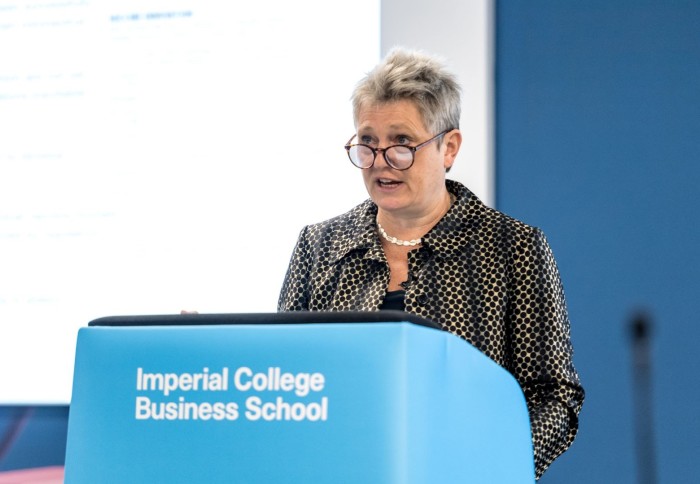Deep tech is crucial to the next great wave of innovation, say experts

Dame Kate Bingham discusses the work of the Vaccine Taskforce at the conference
For deep technology to rise to the challenge of solving the world’s most pressing issues, cooperation is key, experts agreed at a conference.
Speakers and panelists from academia and the business world gathered in-person and online for the Business School's seventh annual conference: Deep Tech: Harnessing the Next Great Wave of Innovation.
Industry leaders, policymakers, academics and researchers discussed how the rapid advancement of deep tech is urgently needed to boost productivity and solve some of the most pressing challenges facing society today, such as climate change and the health crises. While disruptive innovations in science and engineering have the power to change the world, they require collaborative ecosystems to be successfully commercialised, the experts agreed.
The experts also discussed the financing, incentives, business models and institutional settings critical to harnessing deep technologies.
Watch the video of the full conference below.

The merits of risk and speed
The first keynote speech was delivered by Dame Kate Bingham, Managing Partner at SV Health Investors, who chaired the Vaccine Taskforce (VTF) during the COVID-19 pandemic. She outlined the role of the taskforce, a group spearheaded by the Government’s Chief Scientific Advisor Patrick Vallance, in driving forward the development and production of a vaccine.
She also explored what the work of the VTF could teach us about innovation and how a venture capitalist mindset can be used to tackle global challenges.
"The main thing we had to manage within government was for them to accept uncertainty and that is what we do in venture [capitalism],” she said. “I had a very clear mandate for speed, which was helpful, and they [the government] did accept the concept that we were going to take risks and there were going to be losses.
She added: “The government calls this ‘no regrets funding’ and this was a game changer for us because, if we hadn’t had that, we wouldn’t have been able to work as quickly as we did.”
VTF’s success resulted in the G7 committing to a 100-day response to the next pandemic, whether through global surveillance, observing potential new pathogens, or the preparation of prototype vaccines and therapeutics. The lessons about accepting uncertainty, risk and dramatic decision-making could also be applied to make fast progress in other areas, such as Alzheimer's, she said.
Why deep tech matters
In a series of panel discussions, experts from the worlds of academia, business, finance and government discussed the critical nature of some of the issues deep tech can be used to solve, as well as some of the hurdles to achieving this.
“There is still a long way to go for the government to become technically literate enough to understand what is happening in the technology space." Dr Deeph Chana Co-Director of the Institute for Security Science & Technology
Banmali Agrawala, President of Infrastructure, Defence & Aerospace at Tata Sons, pointed to some of the “chronic problems” faced by people in emerging markets, such as hunger, poor healthcare and education, and climate change, and said deep tech provided the possibility of a “silver bullet” for these issues.
Speaking on a panel on deep tech and national security, Dr Deeph Chana, Co-Director of the Institute for Security Science & Technology at Imperial College London, said: “There is still a long way to go for the government to become technically literate enough to understand what is happening in the technology space. This creates a massive problem when we talk about helping to create processes and policies for innovation.”

Advancing deep tech
A common theme discussed during the event, was the crucial need for collaboration between business and academia to advance deep tech to help solve societal challenges.
Sir Ronald Cohen, Chairman of the Global Steering Group for Impact Investment, shared a positive message about the financing available for deep tech ventures, stressing “there is more money available than there has ever been for projects that want to deliver impact as well as profit.”
Professor Francisco Veloso, Dean of Imperial College Business School, said: “If we want to tackle some of the world’s fundamental challenges...we really need to take some of the technologies that are in leading labs around the world – and certainly at Imperial College – and think about how we put them in a position where they can go out into the world at scale and make an impact on broader business and society. This is very hard to do.”
He went on to explain how Imperial’s Institute for Deep Tech Entrepreneurship is using the experience and connectivity of the College to advance our understanding of these critical issues and the best ways to commercialise deep tech solutions.
Ramana Nada, the Conference Chair and Professor of Entrepreneurial Finance at Imperial College Business School, closed the conference, reflecting on the importance of talent and in particular STEM talent within government and venture capital, as well as the potential of government to play a catalytic role to get the most out of deep tech.
The conference was held at Scale Space White City, the first workplace dedicated to helping scaleups innovate and grow. Born out of a joint venture between the UK’s leading digital venture builder Blenheim Chalcot and Imperial College London, the multidisciplinary space provides a home for cutting-edge research, ideation and incubation settings with tailored support at every stage. Scale Space is based in the White City Innovation District (WCID) home to some of the world’s most innovative organisations, spanning life sciences, deep tech, media and the creative arts. Read more about WCID here.
Article text (excluding photos or graphics) © Imperial College London.
Photos and graphics subject to third party copyright used with permission or © Imperial College London.
Reporter
Evie Burrows-Taylor
Business School